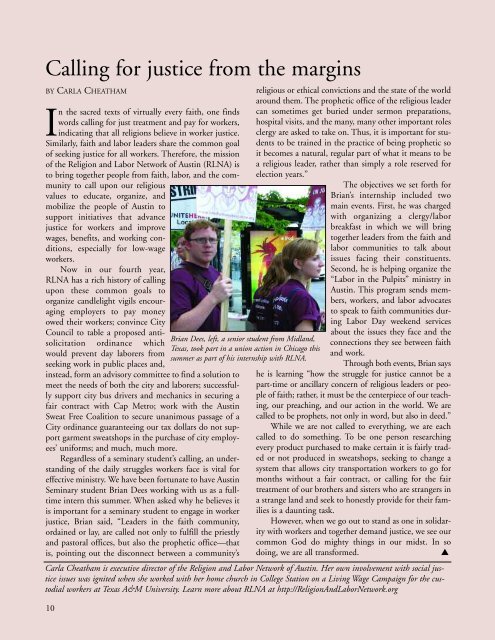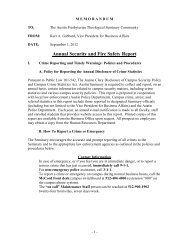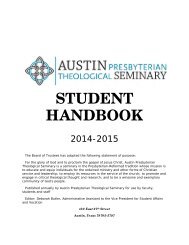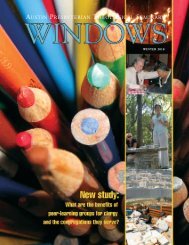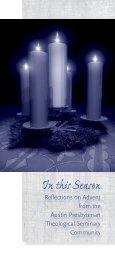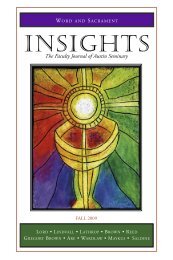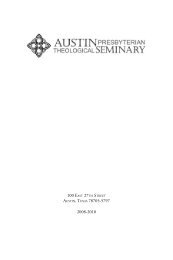AUSTIN PRESBYTERIAN THEOLOGICAL SEMINARY
windows summer 07 - Austin Presbyterian Theological Seminary
windows summer 07 - Austin Presbyterian Theological Seminary
- No tags were found...
Create successful ePaper yourself
Turn your PDF publications into a flip-book with our unique Google optimized e-Paper software.
Calling for justice from the margins<br />
BY CARLA CHEATHAM<br />
In the sacred texts of virtually every faith, one finds<br />
words calling for just treatment and pay for workers,<br />
indicating that all religions believe in worker justice.<br />
Similarly, faith and labor leaders share the common goal<br />
of seeking justice for all workers. Therefore, the mission<br />
of the Religion and Labor Network of Austin (RLNA) is<br />
to bring together people from faith, labor, and the community<br />
to call upon our religious<br />
values to educate, organize, and<br />
mobilize the people of Austin to<br />
support initiatives that advance<br />
justice for workers and improve<br />
wages, benefits, and working conditions,<br />
especially for low-wage<br />
workers.<br />
Now in our fourth year,<br />
RLNA has a rich history of calling<br />
upon these common goals to<br />
organize candlelight vigils encouraging<br />
employers to pay money<br />
owed their workers; convince City<br />
Council to table a proposed antisolicitation<br />
ordinance which<br />
would prevent day laborers from<br />
seeking work in public places and,<br />
instead, form an advisory committee to find a solution to<br />
meet the needs of both the city and laborers; successfully<br />
support city bus drivers and mechanics in securing a<br />
fair contract with Cap Metro; work with the Austin<br />
Sweat Free Coalition to secure unanimous passage of a<br />
City ordinance guaranteeing our tax dollars do not support<br />
garment sweatshops in the purchase of city employees’<br />
uniforms; and much, much more.<br />
Regardless of a seminary student’s calling, an understanding<br />
of the daily struggles workers face is vital for<br />
effective ministry. We have been fortunate to have Austin<br />
Seminary student Brian Dees working with us as a fulltime<br />
intern this summer. When asked why he believes it<br />
is important for a seminary student to engage in worker<br />
justice, Brian said, “Leaders in the faith community,<br />
ordained or lay, are called not only to fulfill the priestly<br />
and pastoral offices, but also the prophetic office—that<br />
is, pointing out the disconnect between a community’s<br />
religious or ethical convictions and the state of the world<br />
around them. The prophetic office of the religious leader<br />
can sometimes get buried under sermon preparations,<br />
hospital visits, and the many, many other important roles<br />
clergy are asked to take on. Thus, it is important for students<br />
to be trained in the practice of being prophetic so<br />
it becomes a natural, regular part of what it means to be<br />
a religious leader, rather than simply a role reserved for<br />
election years.”<br />
The objectives we set forth for<br />
Brian’s internship included two<br />
main events. First, he was charged<br />
with organizing a clergy/labor<br />
breakfast in which we will bring<br />
together leaders from the faith and<br />
labor communities to talk about<br />
issues facing their constituents.<br />
Second, he is helping organize the<br />
“Labor in the Pulpits” ministry in<br />
Austin. This program sends members,<br />
workers, and labor advocates<br />
to speak to faith communities during<br />
Labor Day weekend services<br />
about the issues they face and the<br />
connections they see between faith<br />
and work.<br />
Through both events, Brian says<br />
he is learning “how the struggle for justice cannot be a<br />
part-time or ancillary concern of religious leaders or people<br />
of faith; rather, it must be the centerpiece of our teaching,<br />
our preaching, and our action in the world. We are<br />
called to be prophets, not only in word, but also in deed.”<br />
While we are not called to everything, we are each<br />
called to do something. To be one person researching<br />
every product purchased to make certain it is fairly traded<br />
or not produced in sweatshops, seeking to change a<br />
system that allows city transportation workers to go for<br />
months without a fair contract, or calling for the fair<br />
treatment of our brothers and sisters who are strangers in<br />
a strange land and seek to honestly provide for their families<br />
is a daunting task.<br />
However, when we go out to stand as one in solidarity<br />
with workers and together demand justice, we see our<br />
common God do mighty things in our midst. In so<br />
doing, we are all transformed.<br />
▲<br />
Carla Cheatham is executive director of the Religion and Labor Network of Austin. Her own involvement with social justice<br />
issues was ignited when she worked with her home church in College Station on a Living Wage Campaign for the custodial<br />
workers at Texas A&M University. Learn more about RLNA at http://ReligionAndLaborNetwork.org<br />
10<br />
Brian Dees, left, a senior student from Midland,<br />
Texas, took part in a union action in Chicago this<br />
summer as part of his internship with RLNA.


